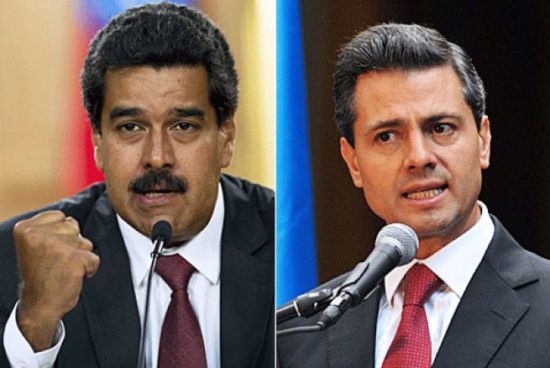Venezuela, in South America, is a beautiful country and rich in natural resources, possessing the world’s largest known oil reserves. For many years it was a stable country, but the past several decades have brought it to disaster.
The economy is in shambles, with a drastic shortage of consumer items, including food and medicine. There’s been a 20% contraction of the country’s GDP in the past three years, and inflation may yet hit 1000%.
Crime is rampant. In calendar year 2016, Venezuela had the second-highest murder rate per capita, and the capital city of Caracas was the year’s world murder capital with a rate of 130.35 homicides per 100,000 inhabitants, a significant increase over the previous year’s rate of 119.87 per 100,000. (Caracas was also the world’s most murderous city the previous year.)
The current leader, Nicolas Maduro, is the successor and protégé of Hugo Chavez. Maduro (who once claimed he had been spoken to by the deceased Chavez in the form of a little bird) is facing a major political crisis, and as of yet he shows no sign of giving in or compromising.
As of August 5th, Reuters reported that “Street protests since April in the South American nation have left more than 120 people dead as rock-throwing protesters have been met by rubber bullets, water cannon and tear gas.”
The Asamblea Nacional, the Venezuelan Congress, has a majority of opposition representatives. So, Maduro came up with a plan to form a new lawmaking body, the “Asamblea Nacional Consituyente,” the National Constituent Assembly, which would take power away from the real National Assembly and draft a new constitution.
What could possibly go wrong?
On July 30th, the vote for the Constituent Assembly was held.
Tibisay Lucena, president of Venezuela’s CNE (National Electoral Council), claimed that 8 million voters cast ballots – but that figure is disputed, with other reports claiming approximately 3.6 million voted. In July of 2016, the population of Venezuela was estimated at 30,912,302 (CIA: The World Factbook).
On August 2nd, even the CEO of the company that made the voting machines (Smartmatic) charged the government with manipulating the total figure.
In the wee hours of the morning on August 1st, SEBIN (Venezuela’s intelligence service and secret police) agents arrested two opposition leaders, Leopoldo Lopez and Antonio Ledezma, in their homes where they were already under house arrest. On August 5th, Lopez was returned to house arrest but not Ledezma.
On August 5th, the Constituent Assembly ousted the country’s Attorney General, Luisa Ortega, who although being of Maduro’s own party had become a critic.
Julio Borges, head of the National Assembly (the real Congress), said, “What we’re seeing in Venezuela is the complete abduction of all its institutions by a single hand, a single political party.” Maduro’s party is the United Socialist Party of Venezuela, or PSUV.
The Mexican Foreign Ministry announced on July 30th that Mexico does not recognize the results of the Constituent Assembly vote in Venezuela.
On August 3rd, Maduro criticized Mexican President Enrique Peña Nieto, ostensibly over a telephone conversation the Mexican President had with U.S. President Donald Trump. But given the situation in Venezuela, it’s hard not to see it as a response to Mexico’s lack of support for Maduro.
Maduro called Peña Nieto a “coward.” And Mexican Foreign Minister Luis Videgaray responded that, “Cobarde es quien usa el poder del Estado para desmantelar la democracia y arremeter contra su propio pueblo” – “A coward is one who uses the power of the state to dismantle democracy and lash out against his own people.”
Despite the spat, the government of Mexico does not plan to break diplomatic relations with Venezuela.
Another effect on Mexico has been “a surge of asylum seekers to Mexico this year,” as reported by Reuters.
In the first half of 2017 there were 1,420 Venezuelans seeking asylum in Mexico, comprising 21% of all asylum seekers in Mexico in that time period.
That 1,420 figure nearly quadruples the total of Venezuelan asylum seekers from the previous year (2016), in which 361 applied. In 2014 and 2015, there were no Venezuelans applying for asylum in Mexico.
“It’s not normal for so many Venezuelans to come here,” said Socorro Flores, Mexico’s Deputy Foreign Minister for Latin America and the Caribbean.
“The region does not want to see a Venezuela plunged into violence and chaos,” said Deputy Minister Flores.
But it looks as though it’s already happening.
- Statementby the US Department of State: Venezuela’s Illegitimate National Constituent Assembly
- Statement by the Mexican Ministry of Foreign Affairs: Mexico Will Not Recognize the Result of the National Constituent Assembly Election in Venezuela
NOTE: I was interviewed on the Silvio Canto, Jr. talk show on August 1st. We discussed my trip to Mexico and other topics. Click here to listen to the interview, which lasts about half an hour.
By Allan Wall for TYT
——————————
Allan Wall, an educator, resided in Mexico for many years. His website is located at http://www.allanwall.info. The opinions expressed in this article are the writer’s and do not necessarily reflect those of The Yucatan Times.


